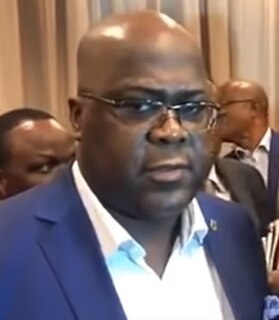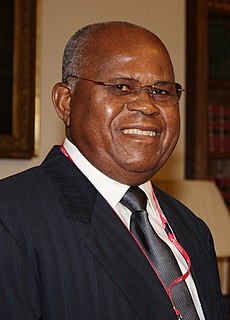The region that is now the Democratic Republic of the Congo was first settled about 80,000 years ago. The Kingdom of Congo remained present in the region between the 14th and the early 19th centuries. Belgian colonization began when King Leopold II founded the Congo Free State, a corporate state run solely by King Leopold. Reports of widespread murder and torture in the rubber plantations led the Belgian government to seize the Congo from Leopold II and establish the Belgian Congo. Under Belgian rule numerous Christian organizations attempted to Westernize the Congolese people.

Joseph Kabila Kabange is a Congolese politician who served as President of the Democratic Republic of the Congo between January 2001 and January 2019. He took office ten days after the assassination of his father, President Laurent-Désiré Kabila. He was elected as President in 2006 and re-elected in 2011 for a second term. Since stepping down after the 2018 election, Kabila, as a former president, will be a senator for life, according to the Constitution of the DRC.

Léon Kengo wa Dondo is a Congolese politician who served as the "first state commissioner" several times under Mobutu Sese Seko in Zaïre. He was one of the most powerful figures in the regime and was a strong advocate of economic globalization and free-market economics. Since 2007, he has been President of the Senate of the Democratic Republic of the Congo.

The Union of Federalists and Independent Republicans is a political party in Democratic Republic of the Congo. Since the actual electoral strength of the political parties in Congo is not known, the size of the party cannot be determined.

General elections were held in the Democratic Republic of the Congo on July 30, 2006, the first multiparty elections in the country in 41 years. Voters went to the polls to elect both a new President of the Republic and a new National Assembly, the lower-house of the Parliament.

Vital Kamerhe is a Congolese politician and leader of the Union for the Congolese Nation, an opposition political party. He was President of the National Assembly of the Democratic Republic of the Congo from 2006 to 2009. After resigning from that office, he went into opposition and founded the UNC. Kamerhe was a candidate in the 2011 presidential election.
Modeste Mutinga Mutuishayi, commonly known as Modeste Mutinga, is a journalist and senator of the Democratic Republic of Congo. He is the publisher of Le Potentiel, which The Committee to Protect Journalists described as "the only independent daily newspaper in the war-torn Democratic Republic of Congo". According to Mutinga, the paper has "an agenda" of promoting economic development and democracy.

Frédéric Kibassa Maliba was a politician in the Democratic Republic of the Congo (DRC). Kibassa held the positions of Deputy Minister of Mines and then Minister of Mines in the Laurent-Désiré Kabila government. He was accused of misappropriating funds in June 2000, while he was Minister of Mines.

Elections were held in the Democratic Republic of the Congo for 108 seats of the country's Senate on 14 March 2019. Former DRC President Joseph Kabila, who stepped down from office in January 2019 following the inauguration of the recently elected Félix Tshisekedi, has also joined the upper house of the legislature as a senator for life, for a total of 109 seats.

General elections were held in the Democratic Republic of the Congo on 30 December 2018, to determine a successor to President Joseph Kabila, as well as for the 500 seats of the National Assembly and 715 provincial council seats. It was announced on 10 January 2019 that Félix Tshisekedi (UDPS) won with 38.6% of the vote, defeating another opposition candidate, Martin Fayulu, and Emmanuel Ramazani Shadary, backed by the ruling party PPRD. Fayulu alleged that the vote was rigged against him in a deal made by Tshisekedi and outgoing President Kabila, challenging the result in the DRC's Constitutional Court. Different election observers, including those from the country's Roman Catholic Church, also cast doubt on the official result. Nonetheless on 20 January the Court rejected his appeal and declared Tshisekedi as the winner. Parties supporting President Kabila won the majority of seats in the National Assembly. Félix Tshisekedi was sworn in as the 5th President of the Democratic Republic of the Congo on 24 January 2019, making it the first peaceful transition of power in the country since it became independent from Belgium in 1960.

Monique Mukuna Mutombo is a Congolese politician. She declared her independent candidacy for the 2016 presidential election in March that year. Mutombo has been critical of the leadership of President Joseph Kabila.
Jean Andeka is a politician in the Democratic Republic of the Congo and was a candidate in the 2011 presidential election. He is a practicing lawyer in Gombe, graduated from the University of Kinshasa, and was the first candidate to file for election.
Samy Badibanga Ntita is a Congolese politician who was Prime Minister of the Democratic Republic of the Congo from November 2016 to May 2017.

On 20 December 2016 the Democratic Republic of the Congo's president, Joseph Kabila, announced that he would not leave office despite the end of his constitutional term. Protests subsequently broke out across the country, which has never had a peaceful transfer of power since it gained independence in 1960. The protests were met with the government's blocking of social media, and violence from security forces which left dozens dead. Foreign governments condemned the attacks against protesters.
The following lists events in the year 2017 in the Democratic Republic of the Congo.

Félix Antoine Tshisekedi Tshilombo is a Congolese politician who has been the President of the Democratic Republic of the Congo since 24 January 2019. He is the leader of the Union for Democracy and Social Progress (UDPS), the oldest and largest party of the Democratic Republic of Congo. He is also the son of late Étienne Tshisekedi, a three-time Prime Minister of Zaire and opposition leader. Tshisekedi was the UDPS party's candidate for president in the December 2018 general election, which he won, despite accusations of irregularities from European and Catholic Church election monitoring organizations. His victory was upheld by the Constitutional Court of the DRC after another opposition politician, Martin Fayulu, challenged the result. Recently, he has named his coalition partner and political heavyweight, Vital Kamerhe, as his Chief of Cabinet.
Emmanuel Ramazani Shadary is a politician in the Democratic Republic of the Congo, who was a presidential candidate in the December 2018 presidential elections in the country. He was selected following consultations within the ruling People's Party for Reconstruction and Democracy (PPRD) political party and the Common Front for Congo (FCC), political coalition. Shadary is the permanent secretary of the PPRD, and has previously served as the country's Interior Minister.

Martin Madidi Fayulu is a businessman and lawmaker from the Democratic Republic of the Congo. He is the leader of the Engagement for Citizenship and Development party. On 11 November 2018, he was chosen by seven opposition leaders to be their joint presidential candidate in the 2018 Democratic Republic of the Congo general election. However, within 24 hours, Félix Antoine Tshisekedi Tshilombo, the eventual winner of the 2018 presidential election and Vital Kamerhe, the other oppositional candiate, rescinded their endorsement of his candidacy and formed their own pact with Tshisekedi as candidate.

Nicolas Kazadi is a Congolese politician and career diplomat who has been Ambassador-at-large for the Democratic Republic of the Congo since 7 March 2019.



















